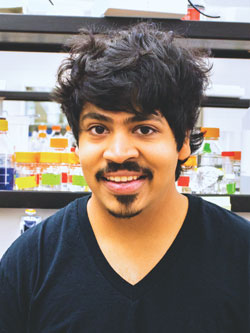
The tagline of Aman Imani's A New Normal blog reads "I want you to know these things. Sincerely, a scientist." He started the science-focused blog in 2018 with a simple goal: “create engaging content on important topics that is accessible to a broad audience”. But in a world of misinformation and conspiracy theories online, the fourth-year Biochemistry, Molecular Biology and Biophysics graduate student in Professor Michael Freeman’s group continues to use his background and knowledge in science to try to break through the online clutter with verifiable data. Currently, Imani studies how microbes make highly-modified peptide molecules called borosins, with the goal of using these molecules as therapeutics. We recently caught up with Imani to hear about his science communication background, recent blog popularity and future plans in science education and communication.
How did you get started with your blog and science communication more broadly?
I created my blog in 2018 as a response to the worrisome rise of misinformation, conspiracy theories, and fake news on social media. It's easy to feel helpless in the face of people rejecting established facts, so I decided to do something about it. My goal was to create engaging content on important topics that is accessible to a broad audience. Verifiability is also an important goal; every fact in every article I write cites peer-reviewed research or information from reputable sources like the CDC or NIH.
What about your COVID-19 piece garnered so much attention?
A few weeks ago, I wrote a piece titled 'Evaluating the Covid-19 mRNA Vaccine' explaining the science of mRNA vaccines and dispelling myths. For a small blog like mine, I was surprised to see that the article got thousands of views from people in around 35 countries. Multiple factors likely contributed to this attention - Covid-19 cases were spiking after the holiday season, this was the first time mRNA vaccines had been approved by the FDA, and the Pfizer and Moderna/BioNTech mRNA vaccines had started being administered to the public. A mix of worry, hope, and confusion fueled folks to seek out information, and maybe my piece was able to provide that using accessible language.
What's important, in your mind, to have success in communicating science to the broader public?
Two things come to mind. First, start small and tell a story. Anecdotes have a way of capturing our attention. The reader is more likely to assimilate information if they're invested in the story. Second, don't "dumb it down." There is a distinction between dumbing something down and making it simpler. You can do the latter by stripping the content of jargon and using plain English, without being condescending to your audience.
What are your career aspirations and why are you interested in that?
I would love to lead a team that discovers and investigates niche microbes and their chemical repertoire for therapeutic purposes. Nature is the wisest teacher, and we still have a lot to learn from her.
- Lance Janssen